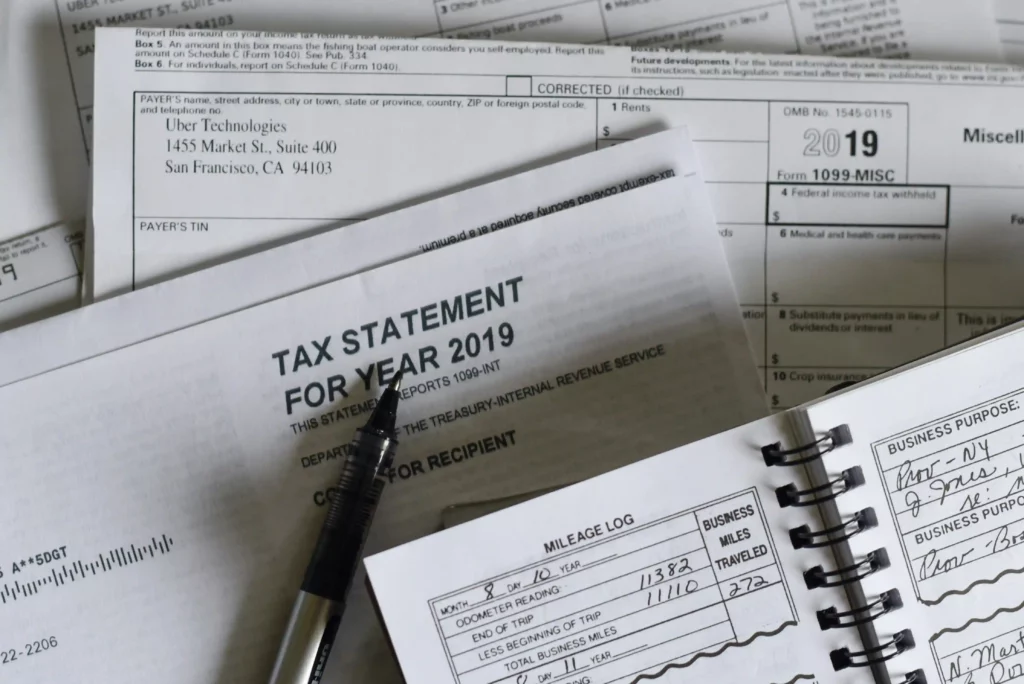Tax Planning: 6 Benefits for Your Business
Explore 6 key benefits of strategic tax planning—from reducing liabilities to driving sustainable growth. Uncover professional tips to optimize your business structure, ensure compliance, and unlock financial success.
The American University noted in a recent survey that nearly 76% of respondents, including small business owners, lack baseline tax knowledge to file their returns efficiently and on time. In another study, the Tax Foundation estimated that poor tax planning and the complexity of the federal tax code cost Americans over $546 billion annually. These statistics paint a critical tax literacy gap that can affect compliance goals and drag businesses through unnecessary risks, such as random audits by the IRS.
Fortunately, while mastering tax regulations can be daunting to non-technical individuals, understanding how these rules work and leveraging them to your advantage can benefit your business in many ways. Explore our tax planning services guide to learn more about your tax obligations, how various provisions work, and proven strategies to lower overall liabilities when filing.

What is Tax Planning?
Tax planning involves analyzing your company’s financial plan or situation to ensure that it’s consistent with overarching business goals and allows you to pay lower taxes when filing returns. Other goals of tax planning include fostering compliance with state and federal tax regulations and positioning your business to avoid unnecessary risks, such as financial loss.
What is Tax Planning?
Definition
Tax planning is the process of analyzing your financial situation and arranging your affairs in a way that minimizes tax liability while remaining compliant with the law.
Why It Matters
- Minimizes tax liability and optimizes savings
- Ensures compliance with tax regulations
- Helps in making informed financial decisions
- Improves cash flow management
Key Strategies
- Income Timing
- Utilizing Deductions and Credits
- Retirement Planning
- Investment Decisions
What Are Tax Planning Services?
Tax planning services from qualified specialists, such as accountants and financial analysts, help entities create business plans and shrink their returns.
Reputable firms like Evans Sternau CPA provide various services depending on the underlying business needs and the unique tax obligation requirements. These include fiscal situation analysis, corporate structure organization, strategies for minimizing taxes, and investment plans.
Additionally, tax planning pros usually collaborate with lawyers to ensure their services are consistent with legal and ethical standards while maximizing money-saving opportunities for your business.

Why Is Tax Planning Important?
Tax planning strategies help businesses of all sizes legally minimize liabilities and optimize short-term and long-term financial goals. With professional financial advice, your venture can reduce its overall tax burden to file for the lowest returns possible and implement contingency plans for proactive risk management, fostering business growth and continuity even amid uncertainties. But that’s not all. Here are the six top benefits of tax planning:
1. Tax Reduction
Taxation professionals have the knowledge and technical know-how to help businesses across various industries lower their taxable income through multiple strategies, such as claiming deductions, exemptions, and credits where applicable. Even better, professionals in this industry can help you identify some commonly missed deductions that can save your business a lot of money when claimed regularly.
For instance, the IRS allows qualified homeowners and renters to claim certain home office deductions in their returns if they use part of their residential space or a structure in their property exclusively as their primary business location.
By writing off home office expenses, such as a portion of your real estate taxes, mortgage interest, and rent, your business can maximize opportunities for freeing up extra capital, which can be reinvested into more demanding departments or other initiatives to stimulate profits.
Many businesses miss out on valuable deductions simply because they aren’t aware of them. By exploring common tax deductions for small businesses, you can identify expenses that qualify for write-offs, ultimately reducing your taxable income.
2. Retirement Planning Assistance
Working with financial advisors who understand tax planning preparation strategies can help your business implement sound retirement plans that align with its overarching goals while seizing money-saving opportunities.
For example, an expert will advise you to contribute to personal and employee retirement plans, such as 401 (k) plans and SEP IRAs. By doing so, you can lower your company’s taxable income and position yourself and your employees to compound tax-deferred savings, which are only taxable upon withdrawal during retirement.
At the same time, contributions to some of these plans are often excluded from taxable wages, allowing business owners to lower their overall payroll taxes for years.
Effective retirement planning goes beyond just setting aside funds—it involves tax-efficient strategies that can maximize long-term savings. Learn how retirement planning strategies can help you and your employees build a more secure financial future.
3. Tax Gain-Loss Harvesting
Tax-gain loss harvesting is among the most overlooked tax planning benefits that can help companies optimize their returns and save more of their earnings. Entities that engage financial professionals can employ strategies for reducing capital gains liability, such as selling poor-performing investments to use capital losses to offset profits from other investment vehicles. This allows you to compensate long-term gains with long-term losses, positioning the underlying business to improve cash flow and foster profitability.
Additionally, this strategy allows businesses to rebalance their investment portfolio while avoiding unnecessary tax costs. For example, you can offload struggling assets to rechannel capital to more promising opportunities with potentially lucrative gains.
4. Optimization of Business Structure
With prudent tax planning in Houston, you can optimize the legal structure of your business to choose the right entity and directly reduce its tax liabilities. Financial experts can help you choose the most tax-advantageous business structure, such as an S-Corporation (S-Corp), which allows you to skip the double taxation limitation of regular C corporations. Typically, S-Corp owners can pass profits and some losses to their personal income without being subject to corporate tax rates.
Adopting a pass-through structure may also allow your business to claim deductions of up to 20% of net business income under the Tax Cuts and Jobs Act, which remains one of the major overhauls of the tax code in over 30 years. Other business structures allowing owners to enjoy pass-through taxation benefits include partnerships, sole proprietorships, and limited liability companies (LLCs).
Ensuring compliance with ever-changing tax laws can be overwhelming, but it’s essential for avoiding penalties and audits. Discover why accounting compliance matters and how to stay on top of regulatory requirements.
5. Sustainable Growth
Another importance of tax planning is strategic business growth. By planning your returns effectively, you can claim various credits and deductions, lower liabilities, and free up resources to reinvest in the business and create a strong foundation for unprecedented success.
To understand how taxation specialists can help steer business growth, let’s explore John’s scenario as a viable user case. John runs a small home cleaning business that employs three individuals. After engaging a financial expert, John realized that certain strategies could help him lower his taxable income, increase profits, and expand his business.
For instance, he can claim relevant credits or deductions and use the extra money to upgrade cleaning equipment, improving efficiency and productivity in the long haul. This allows his startup to deliver high-quality services, which translates to more happy customers and business opportunities.
At the same time, the expert might advise John to defer business income to the next year, lowering his current liabilities and improving cash flow to offset immediate business expenses, such as paying rent or hiring additional employees. With extra capital at hand, John can also expand his services to new neighborhoods while mitigating financial risks that may arise from unforeseen liabilities.
6. Compliance with Laws
Hiring an accountant or a professional in the financial industry can help you stay a step ahead of regulators when it comes to meeting compliance obligations. Businesses that partner with taxation experts can stay updated with dynamic regulations to report accurate income and expenses when filing returns, thereby reducing risks or errors that can trigger penalties and random audits.
Tax planning service providers also leverage advanced software to ensure your business has proper financial documentation and record-keeping, fostering timely filing and payment to the IRS. Moreover, these professionals can help you navigate complex business transactions, such as mergers and acquisitions, in a compliant manner.
How Tax Planning Saves Money Long-Term
Now that you understand what is tax planning and its importance, how can this strategy help you save money in the long term? For the uninitiated, planning taxes strategically can be a powerful tool for driving financial success for years while complying with relevant provisions at the state and federal levels. With the help of an experienced professional, integrating a sound strategy can yield cost-saving benefits in various ways, including:
- Maximizing deductions: Continuous deduction of ordinary business expenses like rent, office supplies, and other utilities lowers your taxable income, allowing you to save significant amounts in the long haul.
- Avoiding unnecessary penalties and random audits: Through proactive planning, your business can avoid late or incorrect filings to prevent penalties and interests, which can also trigger an audit if rampant.
- Optimizing payroll taxes: Providing employee benefits, such as health insurance and education or upskilling assistance, can help your business optimize payroll taxes to reduce long-term labor costs.
- Improving cash flow: Proven tax-saving strategies allow businesses to retain as much of their earnings as possible, leading to prudent financial management in the long term and increased cash availability for future expansion.
- Investment growth: Leveraging tax-advantaged business accounts, such as 401(k) plans for retirement planning, allows you to save for years, minimize overall liability when filing returns, and contribute to long-term success with minimal tax impact.
Have Questions About the Work of a Tax Consultant?
Common Mistakes to Avoid in Tax Planning
Implementing efficient business tax strategies goes beyond understanding the textbook definition of tax planning and its potential advantages in the long run.
Many tax planning mistakes stem from poor preparation. Avoid common pitfalls and get ahead of your tax obligations with these tips for a trouble-free tax season.
As a visionary business owner, you must beware of prevalent mistakes that can lead to significant financial costs, including lost opportunities for savings when filing returns. These mistakes, which are often overlooked, include:

Filing Late
The IRS and other tax authorities in state governments require businesses to file their returns on time; otherwise, late filing fines will be imposed. If they are recurrent, these fines can taint your reputation and eat your profits, eventually pushing you out of business. The same applies to withheld employment taxes, which must be deposited correctly and on time to avoid a penalty.
Underpaying Estimated Taxes
While unscrupulous businesses may underpay taxes as part of their evasion strategies, some startups do it unknowingly because they fail to keep accurate and complete records. Either way, underpaying your taxes can lead to hefty fines and legal action against your company if the problem persists. To avoid this, you can leverage accounting software to automate some tasks to reduce human errors and optimize the overall tax preparation process. Additionally, you can hire a professional beekeeper to lift the burden off your shoulders entirely.
Not Separating Business and Personal Income
Although using one credit card for business and personal expenditures can be tempting, doing so makes it hard to differentiate legitimate financial expenses from personal ones. Besides causing problems when filing returns, this can lead to missed deductions, robbing your business of the opportunity to save more of its earnings. With this in mind, use budgeting tools to separate your business transactions from personal expenses. Even better, you can hire a professional to handle business financials as you focus on yourself.
Missing Eligible Deductions and Credits
The federal tax code provides various breaks to incentivize large and small business owners like you. However, many owners often fail to claim even the most obvious tax breaks, such as deductions and credits, because they are unaware or afraid of triggering an audit. By developing an all-encompassing strategy, your startup could benefit from money-saving deductions like home office rent and equipment purchases, as well as relevant credits, such as employee retention credits, retirement credits, and research and development credits.
Overlooking Professional Tax Planning Services
Trying to DIY your taxes could be a costly mistake, especially if you have no legal background or the technical know-how to handle complex business transactions. Instead of gambling with the financial future of your business, you can hire a tax specialist to develop a comprehensive strategy that matches your long-term goals and reduces the risk of errors and audits. When searching for an expert, ensure you find a trustworthy professional with proven credentials that back their understanding of complex taxation laws.
Industry-Specific Tax Planning Tips
Industry-centric tax planning strategies allow businesses to take advantage of certain credits and deductions that apply to their unique operations. Here are some tips for planning taxation strategies if your business falls in the following industries:

Technology Industry
Technology service providers can claim credits for research and development expenses, including the costs of building new software products from scratch. If you’re a third-party company that doesn’t build tech tools from scratch, you can leverage bonus depreciation or Section 179 to offset the costs of acquiring hardware and software.
![]()
Real Estate Industry
Companies within the real estate sector have unique opportunities to lower their overall liabilities and maximize profitability. For instance, as a realtor, you can structure your business as a partnership, S-Corp, or sole proprietorship to deduct up to 20% of the qualified business income when filing returns. Alternatively, you can use 1031 exchanges to defer capital gain taxes or deduct depreciation on leased properties to offset rental income. Read more about tax-efficient real estate exit strategies.
![]()
Healthcare Sector
If you’re a self-employed practitioner or a company-based service provider in the healthcare industry, you can optimize your returns by claiming relevant medical expense deductions. You can also contribute to a Health Savings Account (HSA) to grow tax-free savings on medical costs or set up Flexible Spending Accounts (FSAs) to lower payroll taxes.
![]()
Manufacturing Industry
Companies in the manufacturing industry can lower their taxable income by conducting cost-segregation studies to accelerate depreciation on building components. Manufacturers can also claim the production activities deduction, especially for domestic operations under Section 199A.
Year-Round Tax Planning vs. Year-End Tax Planning
Year-round planning entails reviewing your company’s financial health on an ongoing basis to ensure alignment with the underlying unique tax situation. On the other hand, year-end planning includes making last-minute changes to lower the company’s taxes before the year closes.
While 5 to 7% of top business managers in the U.S. leverage year-end strategies to save taxes, the strategy is reactive and shouldn’t be substituted for a proactive approach that saves money, lowers unnecessary stress, and helps foster a stronger financial foundation.
In addition to presenting consistent tax-saving opportunities, year-round planning allows you to stay abreast of financial records and payments at all times, ensuring ongoing compliance and accuracy to mitigate the risks of audits and penalties. It also allows you to identify resources that can be spared throughout the year to cater for future investments.
Waiting until the last minute to plan your taxes can lead to missed opportunities. Learn how year-end tax planning can help high earners optimize their financial strategies before the year closes.
Have Questions About Tax Planning?
Planning taxes can be daunting for new business owners seeking to balance money-saving opportunities and compliance goals. If you have doubts about your current plan, feel free to engage experts at Evans Sternau CPA to reevaluate your unique position and provide you with a long-lasting solution that will steer business growth.
Navigating tax planning can be complex, but professional guidance makes all the difference. Our tax advisory and preparation services can help you optimize tax strategies and ensure compliance.

